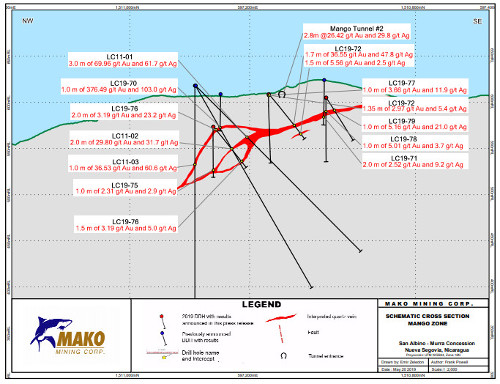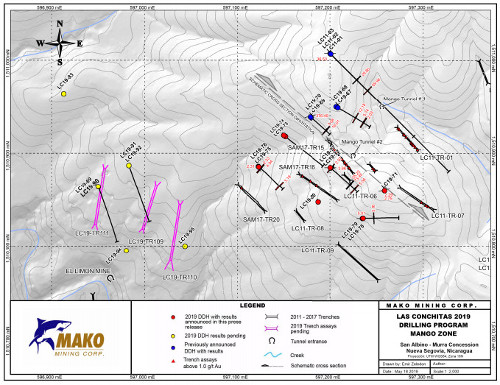Mako Mining Corp. (TSX-V: MKO) (“Mako” or the “Company”) is pleased to announce positive drill results from the Las Conchitas area of its wholly-owned San Albino-Murra property located in Nueva Segovia, Nicaragua.
The goal of the 2019 drill program at Las Conchitas was to confirm the near surface, shallow dipping, high-grade gold mineralization previously encountered in trenches and drill holes. The Company has now completed 14 shallow drill holes totaling 827.30 meters (“m”) within the Mango Zone in 2019 (see the attached map). Additionally, five drill holes were completed in 2011 totaling 1,397.45 meters (see Golden Reign Resources Ltd. press release dated February 22, 2012). The Mango Zone is part of the Las Conchitas area and is located approximately 2.5 kilometers south of the fully permitted San Albino gold project.
This press release contains results from an additional nine holes totaling 557.75 m drilled into the Mango Zone. Results from the first five holes were previously reported in a press release dated May 6, 2019.
The highest grade interval reported in this press release was in drill hole LC19-72, which encountered 36.55 g/t Au and 47.8 g/t Ag over 1.7 m. This interval was located approximately 80 m south-southeast of LC19-70, which intersected the highest gold grade drilled to date of 376.49 g/t Au over 1 m (see press release dated May 6, 2019). The results reported in this and previous press releases confirm near surface, high-grade gold mineralization very similar in styles of mineralization, widths and general morphology to that found at the San Albino gold project, which the Company is presently advancing toward production (see press release dated May 6, 2019, including legal disclaimers regarding a production decision). The Mango Zone remains open along strike and down dip.
2019 Diamond Drill Results in the Mango Zone (not previously reported)
| Drill Hole |
From (m) |
To (m) |
Width (m)* |
Au (g/t) |
Ag (g/t) |
Interval Averages |
| LC19-72 |
0.15 |
1.50 |
1.35 |
2.97 |
5.4 |
2.97 g/t gold and 5.4 g/t silver over 1.35 m |
| LC19-72 |
42.90 |
43.40 |
0.50 |
35.23 |
52.2 |
36.55 g/t gold and 47.8 g/t silver over 1.7 m |
| LC19-72 |
43.40 |
44.00 |
0.60 |
0.75 |
2.5 |
| LC19-72 |
44.00 |
44.60 |
0.60 |
73.45 |
89.4 |
| LC19-72 |
54.00 |
55.50 |
1.50 |
5.56 |
2.5 |
5.56 g/t gold and 2.5 g/t silver over 1.5 m |
| LC19-75 |
46.35 |
47.35 |
1.00 |
2.31 |
2.9 |
2.31 g/t gold and 2.9 g/t silver over 1.0 m |
| LC19-76 |
3.00 |
4.00 |
1.00 |
2.33 |
23.0 |
3.19 g/t gold and 23.2 g/t silver over 2.0 m |
| LC19-76 |
4.00 |
5.00 |
1.00 |
4.04 |
23.3 |
| LC19-76 |
47.55 |
49.05 |
1.50 |
3.19 |
5.0 |
3.19 g/t gold and 5.0 g/t silver over 1.5 m |
| LC19-77 |
0.00 |
1.00 |
1.00 |
3.66** |
11.9 |
3.66 g/t gold and 11.9 g/t silver over 1 m |
| LC19-78 |
14.00 |
15.00 |
1.00 |
5.01** |
3.7 |
5.01 g/t gold and 3.7 g/t silver over 1 m |
| LC19-79 |
17.35 |
18.35 |
1.00 |
5.16** |
21.0 |
5.16 g/t gold and 21.0 g/t silver over 1 m |
The mineralized intervals shown above utilize a 1.0 g/t gold cut-off grade with not more than 1.0 meter of internal dilution. Lengths are reported as core lengths. Drill holes LC19-68, LC19-73, LC19-74 and LC19-80 did not intersect reportable intercepts. *True widths vary depending on drill hole dip, the veins are shallow dipping and typical true widths are 85-100% of the downhole width. **Samples analyzed utilizing standard Fire Assay-Gravimetric methods; metallic screen assays are pending.
The Mango Zone comprises two historical collapsed tunnels and numerous small pits, possibly developed in the late 1940’s. These artisanal workings targeted surficial quartz veins, characterized by high-grade gold mineralization. In order to allow better definition and delineation of the mineralized shoots, the Company excavated an entrance at Mango Tunnel #2, situated approximately 60 m from the collar of drill hole LC19-70. Systematic vertical sampling of the tunnel returned numerous high-grade results, including 26.42 g/t Au over 2.8 m. Importantly, sampling has confirmed that gold mineralization is not restricted solely to quartz veins, but also occurs in the host rock (phyllite/schist) containing quartz veinlets (see “Sample Description” in the table below).
| From surface (m) |
To
(m) |
Sample Description |
Width (m) |
Au (g/t) |
Ag (g/t) |
Interval Averages |
| 0 |
1.5 |
Sample includes 0.7 m wide mineralized vein and 0.3 m phyllite - hanging wall and 0.5 m phylite - footwall |
1.50 |
12.50 |
49.1 |
12.50 g/t gold and 49.1 g/t silver over 1.5 m |
| 0 |
1.5 |
Sample includes 1.2 m wide mineralized vein and 0.3 m phyllite - footwall |
1.50 |
17.70 |
42.0 |
17.70 g/t gold and 42.0 g/t silver over 1.5 m |
| 0 |
1.3 |
Sample includes 1 m wide quartz vein and 0.3 m phyllite - footwall |
1.30 |
7.87 |
35.9 |
7.87 g/t gold and 35.9 g/t silver over 1.3 m |
| 2.4 |
3.9 |
Sample collected within country rock (phyllites) with quartz veinlets |
1.50 |
6.36 |
11.5 |
6.36 g/t gold and 11.5 g/t silver over 1.5 m |
| 1.5 |
3 |
Sample collected within country rock (phyllites) with quartz veinlets |
1.50 |
2.34 |
5.7 |
26.42 g/t gold and 29.8 g/t silver over 2.8 m |
| 3 |
4.3 |
Sample includes two quartz veins, 0.16 m and 0.3 m wide |
1.30 |
54.20 |
57.5 |
Sampling, Assaying, QA/QC and Data Verification
Drill core was continuously sampled from inception to termination of the drill hole. Sample intervals were typically one meter. Drill core diameter was HQ (6.35 centimeters). Geologic and geotechnical data was captured into a digital database, core was photographed, then one-half split of the core was collected for analysis and one-half was retained in the core library. Samples were kept in a secured logging and storage facility until such time that they were delivered to the Managua facilities of Bureau Veritas and pulps were sent to the Bureau Veritas laboratory in Vancouver for analysis. Gold was analyzed by standard fire assay fusion, 30 gram aliquot, AAS finish. Samples returning over 10.0 g/t gold are analyzed utilizing standard Fire Assay-Gravimetric methods. Due to the presence of coarse gold, the Company has used 500-gram metallic screened gold assays for analyzing samples that yielded a fire assay result greater than 1 g/t, and samples immediately above and below drilled veins. This method, which analyzes a larger sample, can be more precise in high-grade vein systems containing coarse gold. All reported drill results in this press release used the metallic screening method. The Company follows industry standards in its QA&QC procedures. Control samples consisting of duplicates, standards, and blanks were inserted into the sample stream at a ratio of 1 control sample per every 10 samples. Analytical results of control samples confirmed reliability of the assay data.


Qualified Person
John M. Kowalchuk, P.Geo, a geologist and qualified person (as defined under NI 43-101) has read and approved the technical information contained in this press release. Mr. Kowalchuk is a senior geologist and a consultant to the Company.
On behalf of the Board,
“Akiba Leisman”
Interim CEO
About Mako
Mako Mining Corp. is a publicly listed gold mining, development and exploration company. It operates the producing La Trinidad open-pit, heap leach gold mine in Sinaloa State, Mexico and is developing its San Albino gold project in Nuevo Segovia, Nicaragua. Mako’s primary objective is to bring San Albino into production quickly and efficiently, while continuing exploration of prospective targets in both Mexico and Nicaragua.
Currently, Mako is exploring for gold and silver mineralization on more than 60,200 hectares (602 km2) in Sinaloa State, Mexico and on 13,771 hectares (138 km2) at the San Albino-Murra and El Jicaro properties, both in Nueva Segovia, Nicaragua. The Corona de Oro Gold Belt, approximately 3 kilometers wide by 23 kilometers long, contains hundreds of historical mines and workings and spans the entirety of the Company’s Nicaragua land package.
For further information: Mako Mining Corp., Akiba Leisman, Interim Chief Executive Officer, Telephone: 203-862-7059, E-mail: aleisman@makominingcorp.com or visit our website at www.makominingcorp.com and SEDAR www.sedar.com.
Forward-Looking Statements: Some of the statements contained herein may be considered “forward-looking information” within the meaning of applicable securities laws. Forward-looking information is based on certain expectations and assumptions, including that the results pending from the remaining nine drill holes at the Mango zone will support strike and dip continuity of gold mineralization; that the Company’s exploration programs will be successfully completed; that although the Company’s production decision at its San Albino project is not based on a technical study supporting mineral reserves, and therefore not based on demonstrated economic viability, management currently believes the project is on track to achieve its first gold pour by the late summer of 2020; that the Company will be successful in its proposed financing plans necessary for the construction at the San Albino project, including by way of a proposed back-stopped, exempt rights offering; and that upfront capital expenditures required for the construction of San Albino of approximately US$20 million will be sufficient. Such forward-looking information is subject to a variety of risks and uncertainties which could cause actual events or results to differ materially from those reflected in the forward-looking information, including, without limitation, the risks that additional satisfactory exploration results at the Mango zone will not be obtained; that the PEA is preliminary in nature and there is no certainty that the PEA will be realized; the risk of economic and/or technical failure at the San Albino project associated with basing a production decision on the PEA without demonstrated economic and technical viability; that exploration results will not translate into the discovery of an economically viable deposit; risks and uncertainties relating to political risks involving the Company’s exploration and development of mineral properties interests; the inherent uncertainty of cost estimates and the potential for unexpected costs and expense; commodity price fluctuations, the inability or failure to obtain adequate financing on a timely basis and other risks and uncertainties. Such information contained herein represents management’s best judgment as of the date hereof, based on information currently available and is included for the purposes of providing investors with the Company’s plans and expectations at its San Albino project and the Las Conchitas area, and may not be appropriate for other purposes.
Neither the TSX Venture Exchange nor its Regulation Services Provider (as that term is defined in the policies of the TSX Venture Exchange) accepts responsibility for the adequacy or accuracy of this release.


